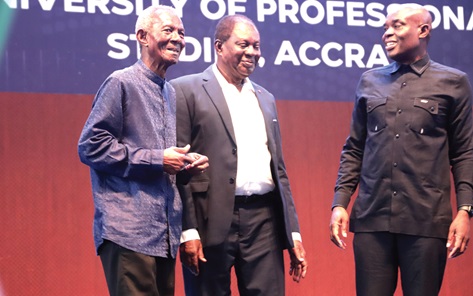
Leverage local capital for lithium, other minerals— Kwame Pianim
An economist, Kwame Pianim, has called for deliberate efforts to mobilise capital and build the capacity of the nation’s human resources to effectively harness and add value to its mineral resources.
He explained that the country was blessed with the recent discovery of lithium which it must take advantage of to reap maximum benefits by refining the natural resource.
“Fortunately, Ghana has lithium, cobalt, manganese, carbide that most factories use.
We also have the people.
For all these concessions of lithium, let us improve it and add value”.
“We can add value to our mineral resources here, so that our young engineers and technocrats will stay home to help, instead of walking through the desert to Libya to cross the high seas to Europe in search of greener pastures,” the statesman stressed.
Mr Pianim, who is also an investment consultant, made the call last Monday in a lecture at the Annual Leadership Lecture series of the University of Professional Studies, Accra (UPSA).
He was addressing the topic: “Re-imagining Ghana's development trajectory for a peaceful prosperous nation by 2057; Our 100th anniversary, through the perspective of the people.”
Mr Pianim stated that owing to the growing demand for lithium across the world, the country should leverage its Ghana Beyond Aid agenda and the African Continental Free Trade Area (AfCFTA) to promote lithium, stating that the resource must be refined in the country for export.
Lithium
Lithium is a highly reactive alkali metal that offers excellent heat and electrical conductivity.
These properties make it particularly useful for the manufacture of glass, high-temperature lubricants, chemicals, pharmaceuticals, and lithium-ion batteries for electric cars and consumer electronics.
Think tanks, civil society organisations and religious leaders have been mounting pressure on the government to drop the lithium mining lease granted Barari DV Ghana Ltd.
While the government maintains that the country’s first lithium deal has improved terms compared to the existing regimes for gold and other minerals, the think tanks and religious leaders are calling on Parliament not to ratify the licence because it is not ‘rewarding enough’ to the country.
There have also been calls to grant mining leases through a tender process.
Corruption
On corruption, Mr Pianim proposed the passage of an Act of Parliament where the first to make a move to betray the other party in a bribery situation should have an advantage.
Under the proposed law, he suggested that corrupt officials found guilty must serve 10 years imprisonment, while the receiver of the bribe should be given some incentives for reporting the matter.
“If you were the receiver of the bribe, once you reported the matter, you got to keep the bribe.
If you were the one leaned upon to pay the bribe, once you reported the matter, you got your money back plus half of the 200 per cent penalty payable by the guilty party.
“You also got your contract or whatever you were after and for which you were being pushed to pay a bribe,” he further advocated.
Additionally, the statesman indicated that the reporter of the bribe under the law would receive five points reward for any government contract he or she would bid for in the future.
“If the bribe was related to health delivery, education or infrastructure that may endanger life, the sentence may be life imprisonment and it will work,” heproposed, in his imagination of how the country should be like by its 100th independence anniversary in 2057.
Making further recommendations on how corruption could be killed in the country, Mr Pianim suggested the digitalisation of all transactions and payments, including the District Assemblies Common Fund (DACF), salaries, Social Security and National Insurance Trust (SSNIT), third party payroll deductions for loans and road contracts, among others.
